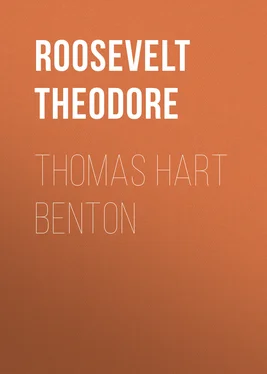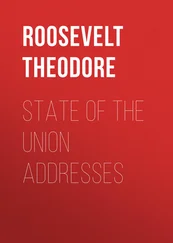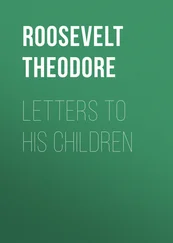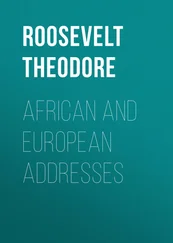Theodore Roosevelt - Thomas Hart Benton
Здесь есть возможность читать онлайн «Theodore Roosevelt - Thomas Hart Benton» — ознакомительный отрывок электронной книги совершенно бесплатно, а после прочтения отрывка купить полную версию. В некоторых случаях можно слушать аудио, скачать через торрент в формате fb2 и присутствует краткое содержание. Жанр: foreign_prose, История, foreign_edu, foreign_antique, на английском языке. Описание произведения, (предисловие) а так же отзывы посетителей доступны на портале библиотеки ЛибКат.
- Название:Thomas Hart Benton
- Автор:
- Жанр:
- Год:неизвестен
- ISBN:нет данных
- Рейтинг книги:4 / 5. Голосов: 1
-
Избранное:Добавить в избранное
- Отзывы:
-
Ваша оценка:
- 80
- 1
- 2
- 3
- 4
- 5
Thomas Hart Benton: краткое содержание, описание и аннотация
Предлагаем к чтению аннотацию, описание, краткое содержание или предисловие (зависит от того, что написал сам автор книги «Thomas Hart Benton»). Если вы не нашли необходимую информацию о книге — напишите в комментариях, мы постараемся отыскать её.
Thomas Hart Benton — читать онлайн ознакомительный отрывок
Ниже представлен текст книги, разбитый по страницам. Система сохранения места последней прочитанной страницы, позволяет с удобством читать онлайн бесплатно книгу «Thomas Hart Benton», без необходимости каждый раз заново искать на чём Вы остановились. Поставьте закладку, и сможете в любой момент перейти на страницу, на которой закончили чтение.
Интервал:
Закладка:
In their private lives their lawless and arrogant freedom and lack of self-restraint produced much gross licentiousness and barbarous cruelty; and every little frontier community could tell its story of animal savagery as regards the home relations of certain of its members. Yet in spite of this they, as a whole, felt the family ties strongly, and in the main had quite a high standard of private morality. Many of them, at any rate, were, according to their lights, deeply and sincerely religious; though even their religion showed their strong, coarse-fibred, narrow natures. Episcopalianism was the creed of the rich slave-owner, who dwelt along the sea-board; but the Western settlers belonged to some one or other of the divisions of the great Methodist and Baptist churches. They were as savagely in earnest about this as about everything else; meekness, mildness, broad liberality, and gentle tolerance of difference in religious views were not virtues they appreciated. They were always ready to do battle for their faith, and, indeed, had to do it, as it was quite a common amusement for the wilder and more lawless members of the community to try to break up by force the great camp-meetings, which formed so conspicuous a feature in the social and religious life of the country. For even irreligion took the form of active rebellion against God, rather than disbelief in his existence.
Physically they were, and are, especially in Kentucky, the finest members of our race; an examination of the statistics relating to the volunteers in the Civil War shows that the natives of no other state, and the men from no foreign country whatsoever, came up to them in bodily development.
Such a people, in choosing men to represent them in the national councils, would naturally pay small heed to refined, graceful, and cultivated statesmanship; their allegiance would be given to men of abounding vitality, of rugged intellect, and of indomitable will. No better or more characteristic possessor of these attributes could be imagined than Thomas Benton.
CHAPTER II
BENTON'S EARLY LIFE AND ENTRY INTO THE SENATE
Thomas Hart Benton was born on March 14, 1782, near Hillsborough, in Orange County, North Carolina,—the same state that fifteen years before, almost to a day, had seen the birth of the great political chief whose most prominent supporter he in after life became. Benton, however, came of good colonial stock; and his early surroundings were not characterized by the squalid poverty that marked Jackson's, though the difference in the social condition of the two families was of small consequence on the frontier, where caste was, and is, almost unknown, and social equality is not a mere figure of speech—particularly it was not so at that time in the Southwest, where there were no servants, except black slaves, and where even what in the North would be called "hired help" was almost an unknown quantity.
Benton's father, who was a lawyer in good standing at the North Carolina bar, died when the boy was very young, leaving him to be brought up by his Virginian mother. She was a woman of force, and, for her time, of much education. She herself began the training of her son's mind, studying with him history and biography, while he also, of course, had access to his father's law library. The home in which he was brought up was, for that time and for that part of the country, straightlaced; his mother, though a Virginian, had many traits which belonged rather to the descendants of the Puritans, and possessed both their strength of character and their austerely religious spirit. Although living in a roistering age, among a class peculiarly given to all the coarser kinds of pleasure, and especially to drink and every form of gambling, she nevertheless preserved the most rigid decorum and morality in her own household, frowning especially upon all intemperance, and never permitting a pack of cards to be found within her doors. She was greatly beloved and respected by the son, whose mind she did so much to mould, and she lived to see him become one of the foremost statesmen of the country.
Young Benton was always fond of reading. He began his studies at home, and continued them at a grammar school taught by a young New Englander of good ability, a very large proportion of the school-teachers of the country then coming from New England; indeed, school-teachers and peddlers were, on the whole, the chief contributions made by the Northeast to the personnel of the new Southwest. Benton then began a course at Chapel Hill, the University of North Carolina, but broke off before completing it, as his mother decided to move her family westward to the almost unbroken wilderness near Nashville, Tennessee, where his father had left them a large tract of land. But he was such an insatiable student and reader that he rapidly acquired a very extensive knowledge, not only of law, but of history and even of Latin and English literature, and thus became a well-read and cultivated, indeed a learned, man; though his frequent displays of learning and knowledge were sometimes marked by a trace of that self-complacent, amusing pedantry so apt to characterize a really well-educated man who lives in a community in which he believes, and with which he has thoroughly identified himself, but whose members are for the most part below the average in mental cultivation.
The Bentons founded a little town, named after them, and in which, of course, they took their position as leaders and rich landed proprietors. It lay on the very outskirts of the Indian country; indeed, the great war trail of the Southern Indians led right through the settlement, and they at all times swarmed around it. The change from the still somewhat rude civilization of North Carolina to the wildness on the border was far less abrupt and startling then than would be the case under similar circumstances now, and the Bentons soon identified themselves completely with the life and interests of the people around them. They even abandoned the Episcopalianism of their old home, and became Methodists, like their neighbors. Young Benton himself had his hands full, at first, in attending to his great backwoods farm, tilled by slaves, and in pushing the growth of the settlement by building first a rude log school-house (he himself taught school at one time, while studying law), and a meeting-house of the same primitive construction, then mills, roads, bridges, and so forth. The work hardened and developed him, and he readily enough turned into a regular frontiersman of the better and richer sort. The neighboring town of Nashville was a raw, pretentious place, where horse-racing, cock-fighting, gambling, whiskey-drinking, and the various coarse vices which masquerade as pleasures in frontier towns, all throve in rank luxuriance. It was somewhat of a change from Benton's early training, but he took to it kindly, and though never a vicious or debauched man, he bore his full share in the savage brawls, the shooting and stabbing affrays, which went to make up one of the leading features in the excessively unattractive social life of the place and epoch.
At that time dueling prevailed more or less throughout the United States, and in the South and West to an extent never before or since attained. On the frontier, not only did every man of spirit expect now and then to be called on to engage in a duel, but he also had to make up his mind to take occasional part in bloody street-fights. Tennessee, the state where Benton then had his home, was famous for the affrays that took place within its borders; and that they were common enough among the people at large may be gathered from the fact that they were of continual occurrence among judges, high state officials, and in the very legislature itself, where senators and assemblymen were always becoming involved in undignified rows and foolish squabbles, apparently without fear of exciting any unfavorable comment, as witness Davy Crockett's naive account of his early experiences as a backwoods member of the Tennessee assembly. Like Jackson, Benton killed his man in a duel. This was much later, in 1817, when he was a citizen of Missouri. His opponent was a lawyer named Lucas. They fought twice, on Bloody Island, near St. Louis. On the first occasion both were wounded; on the second Lucas was killed. The latter came of a truculent family. A recent biographer of his father, Judge John R. Lucas, remarks, with refreshing unconsciousness of the grotesque humor of the chronicle: "This gentleman was one of the most remarkable men who ever settled west of the Mississippi River.... Towards the close of his life Judge Lucas became melancholy and dejected—the result of domestic affliction, for six of his sons met death by violence." One feels curious to know how the other sons died.
Читать дальшеИнтервал:
Закладка:
Похожие книги на «Thomas Hart Benton»
Представляем Вашему вниманию похожие книги на «Thomas Hart Benton» списком для выбора. Мы отобрали схожую по названию и смыслу литературу в надежде предоставить читателям больше вариантов отыскать новые, интересные, ещё непрочитанные произведения.
Обсуждение, отзывы о книге «Thomas Hart Benton» и просто собственные мнения читателей. Оставьте ваши комментарии, напишите, что Вы думаете о произведении, его смысле или главных героях. Укажите что конкретно понравилось, а что нет, и почему Вы так считаете.












